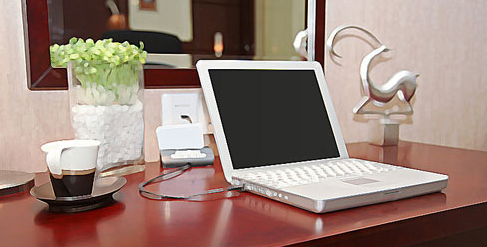Hotel WiFi: Keeping Road Warriors Connected
Connectivity is crucial for business travelers – and for many road warriors, that often means connecting to a hotel WiFi network. Free WiFi is one of the most coveted amenities: a Hotels.com survey of 8,600 travelers worldwide found just 11 percent would be willing to pay for Wi-Fi when staying in a hotel.
GBTA has queried its members before about what ancillaries they are getting from hotels through their negotiations for room rates. The item most commonly added into the negotiated rate is WiFi. A 2014 survey by GBTA found that 85 percent of companies with at least $10 million in spend negotiated free WiFi into their preferred hotel agreements, and 66 percent of companies with less than that negotiating for free WiFi.
This need to connect hasn’t gone unnoticed: hotels are changing how they do business, and in some cases that could affect WiFi access. Some hotels, for example, are requiring travelers to book directly through the hotel site in order to get free WiFi while others are requiring travelers to book through online travel agencies.
Some recent news on this:
- Starwood will begin offering free in-room Internet service to members of its loyalty program who book their stay on the chain’s websites or mobile app.
- Loews Hotels and Resorts is now offering free Wi-Fi to all guests in their rooms, bucking the industry norm of charging for it, especially at higher-end properties.
- Hyatt Hotels announced that it would begin providing free Wi-Fi in guest rooms and public spaces at all Hyatt hotels worldwide as of February 2015. Use of Wi-Fi will not be limited to members of its loyalty programs, as was previously done at some brands. Hyatt Gold Passport members will have access to premium Wi-Fi service at some properties.
In a free market economy, how hotels sell and market their product is a business decision, and they should be allowed to pursue their chosen business model. However, this must be done with transparency and hotels should make sure all policies are clear and known upfront. Hotels should also be discouraged from setting policies that drive consumers to specific sites for special offers. These practices create biases against loyal business customers.
When it comes to WiFi blocking however, the FCC has weighed in loud and clear that this will not be tolerated. This CNET article covers the FCC’s official statement, which says blocking an individual’s personal hotspot, as hotels and convention centers have done, is against the law and subject to fines.
Although Marriott backed off its plan to block WiFi, the FCC made it clear that they – or any other hotel – better not try it again. More recently, Marriott decided to withdraw as a party to the petition seeking direction from the FCC on legal Wi-Fi security measures.
GBTA will continue to follow developments in hotel WiFi and will keep you updated with the latest news and information so you can make educated decisions about your travelers and your travel policy.
View the full brief on hotel issues with the latest information.
#GBTAtrending Tell us if this issue is important to you or your company:
[thumbs-rating-buttons]

